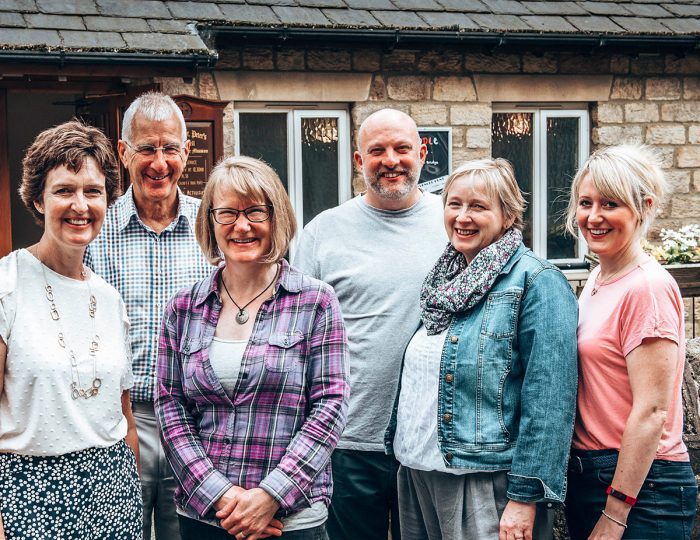Frontline Sundays
Frontline Sundays...
Read

Most churches have them. Most churches have different names for them: home groups, small groups, life groups, cell groups, connect groups – whatever you call them, they exist. And they can be excellent environments not only to study the Bible and get to know one another, but to disciple one another in the ways of Jesus.
Carolyn Rigby and Keith Forrester belong to Barrow Bridge Mission, part of the parish of St Peter’s, Halliwell, Greater Manchester. They share how their small group are helping one another follow Jesus in all of life.
In many ways, it’s a small group like any other. Once a fortnight, a varying number of the 13 who officially belong to the group rock up at Carolyn’s house, shuffle into the kitchen and catch up while the kettle boils. Next, they drift lounge-wards, and everyone sits where they always sit. In the winter months Keith always complains about the wood burner melting his back, though he’s never considered moving to a chair that isn’t directly in front of it!
The group is a mix of ages and occupations: Keith is a decorator, Carolyn an inclusion worker within a school. There are retirees who do voluntary work, a draughtsman, a health worker, a teacher – a real mixed bag. Some, like Keith and Carolyn, have been part of the group for years, others have come and gone.
Back in 2015, the four churches across the parish began to intentionally focus on whole-life disciplemaking. The small groups, including Carolyn and Keith’s, worked through the DVD and study guide resource, Life on the Frontline. It was during this time the culture of the group began to change.
Keith recalls the main things they started doing differently were sharing more about what was going on in their lives, then seeking to apply what they were learning from the Bible to their situations, and then praying about those things at the end of the session. Of course, much of this wasn’t new; they had always shared; they had always studied the Bible, they had always prayed. The change was bringing more of their ordinary lives into the mix.
‘Initially,’ Carolyn recalls, ‘it was a little unnerving because it required a greater degree of honesty and openness… For some it was quite a big shift and it took a bit of time for everybody to be comfortable with being more open.’ As some group members started sharing, others learnt it was safe to do this.
It was an important step, though not the only step. They don’t just talk about their lives, they bring the Bible to bear on their lives – the issues they face, the way they are acting, the attitudes they hold. In light of what they discover in the Bible, they hold one another accountable. At this stage, you rightly ask, what does that look like?
Keith explains that whatever book of the Bible or resource they might be working through, ‘at certain points we stop and ask what does this mean for us? What difference is this going to make tomorrow?’
At the time of writing, the group were working through a resource about grace. Carolyn and Keith shared how pertinent the subject was for both of them, as well as others in the group. Along the way, group members have shared some of the following situations they are in where they are not sure what it means to show grace, or they do know what it means, but are finding it hard to live that out. One has a particularly difficult leader in a voluntary setting. Another is in a highly competitive and dysfunctional team. Someone has a former colleague who’s ended up in prison for a very serious offense, and pretty much all former associates have written this person off.
Having shared these situations, they talk about what it might mean to show grace. And they challenge each other to take action, to do difficult things. The person with the former colleague in prison is considering writing to them, and the group have encouraged them to do so, even though this group member’s natural inclination is to cut him off completely.
They don’t always agree with each other either. They wrestle. Keith has a lad working with him, who sent a text one evening saying he wasn’t feeling well and doubted he would make it into work the next day. At 4.30 the next morning, Keith received a text from this young man’s wife, saying he was in hospital with suspected pleurisy. Then another text saying they had found a shadow on his lung, and it was looking serious. Keith messaged back wishing him well. A couple of days later, he phoned to see how the guy was doing. He got an international dialling tone. Confused, Keith took to Facebook. He discovered this guy was actually in Fuerteventura, his lung as shadow-less as the beach upon which he lay sunning himself! How does grace respond to that?
The group wrestled with this. There were differences of opinion. Keith decided to talk to the guy about it when he came back, but to keep him on. Not many people would do that. Not everyone in the group thought Keith should do that. Keith didn’t find it an easy decision. He was worried it would make him look like a walkover. But he asked them, ‘We’ve been talking about grace and how much grace God has shown to us, shouldn’t I show grace to this lad?’
This ‘one another’ discipling makes a difference. Carolyn finds that ‘hearing other people talk about their everyday lives and how God is involved makes me think more about my own. When others reflect on what God might be saying to them, it encourages me to think about what he might be saying into my life.’
In the context of her home life, Carolyn shared how her 18 and 21-year-old daughters aren’t exactly ‘neat-freaks’. She’s discovering more grace in responding to the clothes strewn all over the floor. It’s making a difference in her school as well. ‘Sometimes parents can be difficult and rude, or people don’t do what they should. In the past I would have been less tolerant, but now I’m more aware that everyone has different things going on in their lives and their heads, which I might not be aware of. I know that Jesus calls me to show the love of God to these people.’
The mutual discipling continues between meetings via WhatsApp. They remind each other they are praying for the things shared, they share relevant scriptures, they update each other on how things are going. Keith says, ‘It’s great knowing someone has your back.’
So, what effect does all this have on the depth of quality of relationships within the group? For starters, they know each other much better as whole people, not just as ‘church’ people. They know more about each other’s failures and weaknesses, their progress and victories. ‘There is less pretence. People realise we’re not perfect and have struggles, but they also see God at work in our lives too,’ shares Keith. It makes for richer conversations when they see each other on a Sunday as well. ‘You don’t have to think hard about something to say. You will ask, “How did your scout thing go?” You know, you just share what’s going on in your life.’
Mutual discipling continues between meetings. They remind each other they are praying, share scriptures, update each other.
We all know what it’s like to focus on a topic as a group for a month or two, then move on to the next thing. For this group, whole-life discipleship is not a topic; it’s a life-long pursuit. It’s become part of their DNA. It’s interesting that six new people have joined the group in the last two years, and they seem to get it quite quickly. Nobody in the group had a conversation with them before they joined, saying ‘we do whole-life discipleship here.’ As people join the group, they see it happening, and as they see others sharing about their lives and offering wisdom and support for others with theirs, they just join it. For them, it’s caught, not taught.
A few years down the line, Keith and Carolyn can’t imagine belonging to a group that didn’t embrace the whole of life, and their encouragement to other small groups is simple. ‘Get stuck into the Bible, learn what it says, connect it to your life. We are called to live like Jesus amongst ordinary people in everyday life. If we’re not helping each other to do that when we meet, what’s the point?’

Some things to try
Visit the small groups
Visit the small groups in your church and find out about their frontlines: what they do, what they enjoy, where they struggle, how their faith shapes the way they view and interact on their frontlines.
Use Fruitfulness on the Frontline
Encourage the small groups in your church to use Fruitfulness on the Frontline. This study has proved to be useful to a wide range of groups, helping them discover the significance of what they do day-to-day, and what it means to be fruitful in those places.
Discuss ideas with your small group leaders
Arrange to meet with the small group leaders to talk through ideas of how to grow a disciplemaking focus. Listen to their ideas, questions, and concerns. This may be a helpful conversation to have after they have used Fruitfulness on the Frontline.

Some things to look at
Fruitfulness on the Frontline
An eight-week course to help participants discover ways they are already being fruitful for God in their day-to-day lives, and how they might become even more fruitful.
Scattered & Gathered by Neil Hudson
Chapter Seven in particular of Scattered & Gathered explores the role small groups can play in encouraging fruitful frontline living.
The Gateway Seven series
A study series on seven books of the Bible, covering seven genres, with a whole-life discipleship focus. Ideal for groups who want to grapple with Scripture and apply it to their daily lives.